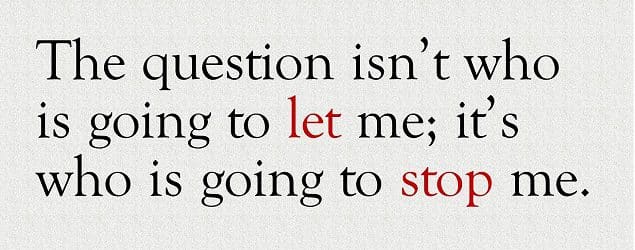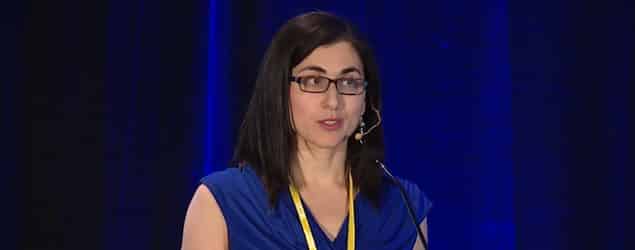Intellectual Ammunition — Campus Speech Controversies

On The Yaron Brook Show this past weekend, Don Watkins and I discussed freedom of speech and the many campus protests and controversies that have broken out over the past few weeks. It’s a really good discussion (if I do say so myself) of a lot of issues that bear on the campus protests, including racism, inequality and even helicopter parenting. During the show, Don and I mentioned a number of essays by Ayn Rand that bear on the campus protests that are worth elaborating on a bit more.
First, if you are interested in understanding the left today, the collection of essays contained in Return of the Primitive: The Anti-Industrial Revolution is essential reading. The book (originally published as The New Left: The Anti-Industrial Revolution) contains a number of essays written by Rand in the 1960s that analyzed various aspects of the new left’s philosophy along with a new introduction and several additional essays by Peter Schwartz.
Turning to particular essays, the best overall for understanding the situation on America’s campuses right now is Rand’s “The Cashing in: The Student Rebellion.” Rand analyses the student rebellion that started on Berkeley’s campus in the mid 1960’s and the so-called Free Speech Movement that went along with it, the philosophical character of the movement, its goals and why it started. The title hints at her explanation of this latter point: what the students were “cashing in” on were the dominant trends in philosophy — “epistemological agnosticism, avowed irrationalism, ethical subjectivism” — which they were absorbing in the very schools against which they were rebelling. One can see these same ideas at the core of today’s student radicals, although it is becoming a bit clearer where they lead.
The clarity of consequences and thus goals of a philosophical movement is the subject of another essay in the book, “The Left: Old & New,” in which Rand compares the New Left campus radicals of the 1960s with the Old Leftists of the 1930s and 40s. She pronounces the Old Left “cleaner” in the sense that they at least gave a nod toward science and industrialization even while they preached collectivism and supported dictatorial regimes like the Soviet Union. But because collectivism is incompatible with individual initiative and thought, which is the source of these values, the New Leftists of the 1960s jettisoned any pretense toward industrialization and technology in favor of nature and the noble (noble-sounding at least) savagery of the hippies. As Rand observes, “Confronted with the choice of an industrial civilization or collectivism, it is an industrial civilization that the leftists discarded. Confronted with the choice of technology or dictatorship, it is technology that they discarded. Confronted with the choice of reason or whims, it is reason that they discarded.” Through the many incarnations of the left in this country, the three fundamentals that have remained untouched, explains Rand, are: “mysticism-altruism-collectivism” and their “psychological manifestation: the lust for power; i.e., the lust to destroy.”
Do Rand’s insights hold up today? Consider the actions of today’s campus protesters and especially how quickly the left has given up on freedom of speech, which, for most of my lifetime, the left championed courageously.
Lest you think that college is the only place where students can absorb bad ideas, keep in mind that the students who are whining about offensive Halloween costumes at Yale and demanding that the media respect the “safe spaces” they’ve created on someone else’s property at U. Missouri had to have learned something before getting to college. In “The Comprachicos,” Rand evaluates what that something is — progressive education — and pronounces it all destructive. The title refers to groups depicted by Victor Hugo in his novel “The Man Who Laughs” that mutilate children to turn them into circus freaks. Rand uses the metaphor as a segue into a critique of modern teaching methods that destroy, not the body, but the minds of children by hobbling their ability to think. The essay was the first thing that came to mind when I watched the now famous video from the Yale controversy that shows a young woman screeching at a professor because of alleged insensitivity he and his wife displayed toward their concerns about potentially offensive Halloween costumes. Throughout the video, the woman demands that Yale be turned into a “safe space.” Safe from what, you might ask? Ideas is one answer. Life is probably the better one.
Of course, because the free speech controversies on campus are so wrapped up in claims of widespread racism, be sure to read Rand’s clarifying essay on the subject as well. Unlike many of today’s intellectuals and the young people they influence, Rand understood racism to be a primitive form of collectivism — as she put it, “the lowest, most crudely primitive form of collectivism.” It is “a caveman’s version of the doctrine of innate ideas — or of inherited knowledge — which has been thoroughly refuted by philosophy and science. Racism is a doctrine of, by, and for brutes.” Certainly, racist laws and government policies have no place in a free society. But the solution to racism, as Rand argued, is not the race-based laws we have today or the hyper-race consciousness or the claim that race is destiny, which we see all around us today. It is freedom and respect for the individual. “The smallest minority on earth,” Rand once noted, “is the individual.” Treat individuals as ends in themselves and protect their rights to do and think as they please and the sort of widespread racism we have seen in the past will die a natural death.
Finally, if you want a sense of why college administrators and professors constantly cave to the demands of the protesters and other agitators on campuses today, I would also recommend reading Rand’s essay “Altruism as Appeasement” in The Voice of Reason: Essays in Objectivist Thought.
I’ll have more to say about the current spate of campus controversies soon. Until then, check out the videos of my two talks, Free Speech Under Siege and Freedom of Speech and the Right to Offend, which I gave at Clemson and Harvard Law School, respectively.



